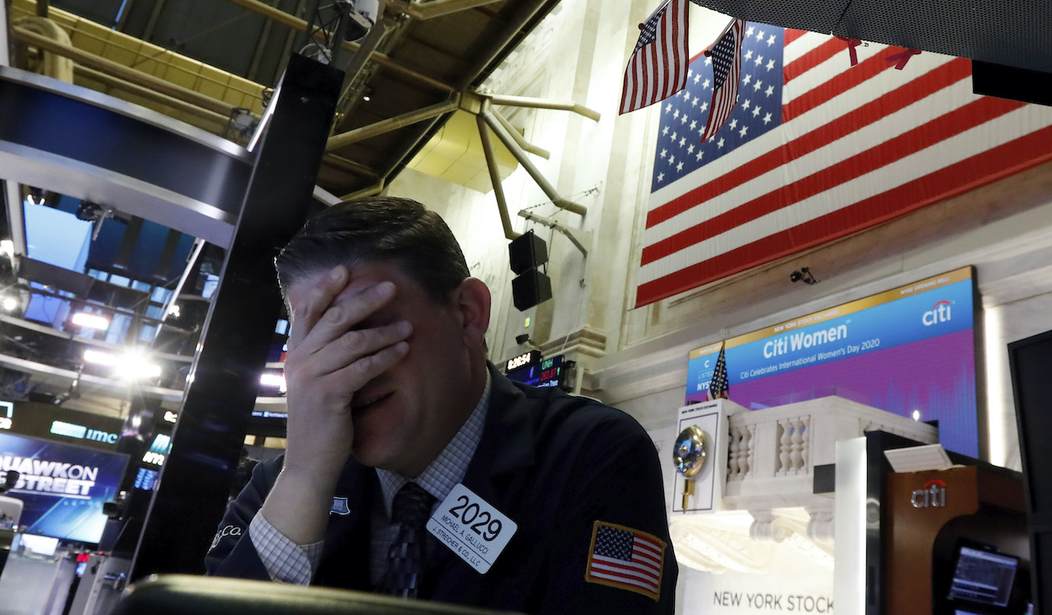We have few material numbers yet from companies or economies on the actual, bottom-line business impact of the coronavirus pandemic. The repeatedly adjusted economic contraction estimates and revisions to guidance for companies - both always to the negative - results in, essentially, almost all predictions before actual numbers post being guesswork at best for these unprecedented circumstances.
The Thursday unemployment numbers reflect this stark reality well. The prior week's new seasonally adjusted unemployment claims, for the week ending on March 21, posted at 3.28 million and coming in at the higher end of the 1-4 million generally estimated. This week's however were a bombshell as there were generally expectations for about 3.76 million and yet the actual numbers posted at a mind-boggling 6.648 million. The prior week's numbers were even adjusted up to 3.307 million. The S&P 500's 2.28% gain in the wake of such news was just about as senseless as it having continued to rally and reach new highs from late January to early February as the coronavirus began to slowly seep into just about every nation in the world.
The fact is that we are seeing the actual numbers post as being often much worse than even the most sophisticated analysts' consensus and now seemingly even sometimes well outside of even a generally expected range. In just two weeks the newly unemployed are now more numerous than all the new jobless claims from 2008 to 2010 during the entire Great Recession. As with seemingly everything in this coronavirus market the worst seems still to come however as the Federal Reserve Bank of St. Louis estimates unemployment could soon enough reach a historic, unprecedented 32.1%.
Recommended
There is a reason the unemployment numbers are of particular concern amid all the various corporate guidance and economic numbers being thrown out. That the American consumer is the heart of the country's economic engine is not only a great feel-good slogan but also is a stark reality. When consumers stop spending or, in this case, can't spend due to lack of jobs and income then the financial contagion quickly spreads to everything from mortgages to consumer debt, from student loans to entertainment/leisure, from demand for new iPhones to even how often one keeps the lights on.
In many ways the 2008 financial crisis began when the consumer's pocketbooks began drying up (whether for many subprime mortgages there ever was the actual pocketbook to begin with is a whole other question) and thus mortgages began defaulting, associated mortgage-related products began defaulting, financial companies with exposure to those assets began defaulting, companies with exposure to those companies the same, and so on and so forth.
In 2020 we now face a similar situation. Even in just the first few weeks of this downturn we see how business and residential rents are already in severe default territory. It is easy to imagine how landlords, who rightly state they have their own obligations in the forms of mortgages and other costs, will soon default or need relief on said costs and debts and add to the lost revenues of other companies and further workers out on the street.
This is not a avalanche, it is a star collapsing into a financial black hole. Even the historic $2 trillion stimulus package passed and signed into law a few days ago already is old news as discussions for more stimulus is already taking place. The United States posted a 2019 Gross Domestic Product of $21.44 trillion - it is easy to see how with the overwhelming bulk of the population carrying on a trickle of their prior economic activity how filling that gap may soon begin accumulating a startling bill.
The Great Recession saw the major indices plummet by 45-50% from their highs in 2007 over the course of about one and a half years. The Great Depression saw the Dow drop over 90% from its September 1929 high over the course of two and a half years before finally finding its bottom in July 1932. If the current lockdowns and disruptions continue for much longer it is much likely we are facing the latter as a simple "un-pause" becomes increasingly difficult amid a sea of defaults and dried-up spending. By contrast, the highest unemployment rate during the Great Depression came in at 24.9% in 1933.
Nowadays we have much more financial controls and cushions in place than the "wild west" of markets in the early Great Depression era where financial institutions invested in securities with bank deposits and the U.S. Securities and Exchange Commission did not come into existence until 1934. The SEC also may delay our full understanding of the impact of coronavirus on companies as it has permitted a 45-day extension of various filings otherwise due March 1 to July 1. It remains clear nonetheless however that we are at perhaps less the the bottom of the valley than at the edge of a precipice - if things continue to crumble too far it will escalate in asset-destroying financial contagion for far longer before it gets better.

























Join the conversation as a VIP Member